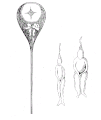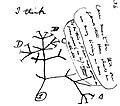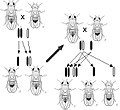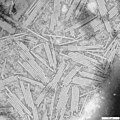Portal:Biology
Introduction
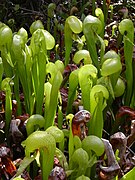

Biology is the scientific study of life. It is a natural science with a broad scope but has several unifying themes that tie it together as a single, coherent field. For instance, all organisms are made up of cells that process hereditary information encoded in genes, which can be transmitted to future generations. Another major theme is evolution, which explains the unity and diversity of life. Energy processing is also important to life as it allows organisms to move, grow, and reproduce. Finally, all organisms are able to regulate their own internal environments.
Biologists are able to study life at multiple levels of organization, from the molecular biology of a cell to the anatomy and physiology of plants and animals, and evolution of populations. Hence, there are multiple subdisciplines within biology, each defined by the nature of their research questions and the tools that they use. Like other scientists, biologists use the scientific method to make observations, pose questions, generate hypotheses, perform experiments, and form conclusions about the world around them.
Life on Earth, which emerged more than 3.7 billion years ago, is immensely diverse. Biologists have sought to study and classify the various forms of life, from prokaryotic organisms such as archaea and bacteria to eukaryotic organisms such as protists, fungi, plants, and animals. These various organisms contribute to the biodiversity of an ecosystem, where they play specialized roles in the cycling of nutrients and energy through their biophysical environment. (Full article...)
Selected article -
Whales use a variety of sounds for communication and sensation. The mechanisms used to produce sound vary from one family of cetaceans to another. Marine mammals, including whales, dolphins, and porpoises, are much more dependent on sound than land mammals due to the limited effectiveness of other senses in water. Sight is less effective for marine mammals because of the way particulates in the ocean scatter light. Smell is also limited, as molecules diffuse more slowly in water than in air, which makes smelling less effective. However, the speed of sound is roughly four times greater in water than in the atmosphere at sea level. As sea mammals are so dependent on hearing to communicate and feed, environmentalists and cetologists are concerned that they are being harmed by the increased ambient noise in the world's oceans caused by ships, sonar and marine seismic surveys.
The word "song" is used to describe the pattern of regular and predictable sounds made by some species of whales, notably the humpback whale. This is included with or in comparison with music, and male humpback whales have been described as "inveterate composers" of songs that are "'strikingly similar' to human musical traditions". It has been suggested that humpback songs communicate male fitness to female whales. (Full article...)Selected picture -

Major topics
Selected biography -
Richard Dawkins FRS FRSL (born 26 March 1941) is a British evolutionary biologist, zoologist, science communicator and author. He is an emeritus fellow of New College, Oxford, and was Professor for Public Understanding of Science in the University of Oxford from 1995 to 2008. His 1976 book The Selfish Gene popularised the gene-centred view of evolution, as well as coining the term meme. Dawkins has won several academic and writing awards.
Dawkins is well known for his criticism of creationism and intelligent design as well as for being a vocal atheist. Some fellow academics have described Dawkins as a secular or atheist fundamentalist. Dawkins wrote The Blind Watchmaker in 1986, arguing against the watchmaker analogy, an argument for the existence of a supernatural creator based upon the complexity of living organisms. Instead, he describes evolutionary processes as analogous to a blind watchmaker, in that reproduction, mutation, and selection are unguided by any sentient designer. In 2006, Dawkins published The God Delusion, writing that a supernatural creator almost certainly does not exist and that religious faith is a delusion. He founded the Richard Dawkins Foundation for Reason and Science in 2006. Dawkins has published two volumes of memoirs, An Appetite for Wonder (2013) and Brief Candle in the Dark (2015). (Full article...)General images -
Did you know -
- ... that endemics along the wildlife of Morocco include more than six hundred species of vascular plants and a single species of bird?
- ... that an extract of Alchemilla diademata, a plant endemic to Lebanon, shows antimicrobial activity against Staphylococcus aureus?
- ... that more than 5,000 hen fleas were recorded from the nest of a coal tit?
Things you can do
Related portals
Biology portals
Categories

Anatomy - Anthropology - Astrobiology - Biochemistry - Bioengineering - Bioinformatics - Biotechnology - Botany - Cell biology - Conservation biology - Developmental biology - Ecology - Environmental science - Evolutionary biology - Genetics - Mathematical biology - Medicine - Microbiology - Immunology - Molecular biology - Mycology - Neuroscience - Paleontology - Palynology Parasitology - Pharmacology -
Phylogenetics - Physiology - Systems biology - Taxonomy - Toxicology - Virology - ZoologyMore topics
WikiProjects

WikiProjects connected with biology:
A complete list of scientific WikiProjects can be found here. See also Wikispecies, a Wikimedia project dedicated to classification of biological species.
Associated Wikimedia
The following Wikimedia Foundation sister projects provide more on this subject:
-
Commons
Free media repository -
Wikibooks
Free textbooks and manuals -
Wikidata
Free knowledge base -
Wikinews
Free-content news -
Wikiquote
Collection of quotations -
Wikisource
Free-content library -
Wikiversity
Free learning tools -
Wiktionary
Dictionary and thesaurus






